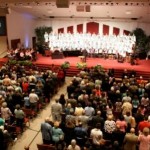The changing face of full-time ministry
A few days ago, when I decided to start writing a short post about “full-time ministry,” I did a Google search on the phrase. I found something interesting. More and more people are writing about (and, hopefully, living) the fact that “full-time ministry” is not something that is relegated to a select few among the church – a few who are paid to do full-time ministry.
Instead, more and more people are realizing that all of Jesus’ followers are called to follow him into full-time ministry – that is, to love God and love others and serve people all the time, wherever they are, regardless of their vocation. (In fact, there are some who are recognizing that those who are paid as “vocational ministers” may be actually doing less ministry/service than those who are working in other vocations, but that’s a topic for another post.)
To be honest, I was surprised (and excited) to find that so many people are beginning to define “full-time ministry” in the way that we find in Scripture – that is, full-time ministry is not about being paid as a vocational pastor to do certain duties for a church-based organization. People are living as full-time ministers while working as sales people, mechanics, programmers, teachers, and many other occupations. People are living as full-time ministers while living as mothers and fathers, students, retirees, etc.
When I read the New Testament, this is the description of ministry that I see – everyone serving others as they share their lives with others (both brothers and sisters in Christ and those who are not believers). When all believers see “full-time ministry” as what happens when they follow Jesus in loving and serving others, I think we’ll begin seeing the kind of response that we read about in the New Testament.
But, as long as we continue to see “full-time ministry” as the responsibility of only a few who are paid to serve on behalf of the whole church, then the spread of the gospel and the maturity of the church will be hindered.
So, like I said at the beginning, I’m excited to read about more and more people seeing “full-time ministry” as their responsibility – at least when it comes to interacting with unbelievers. Unfortunately, I think many still see “full-time ministry” among the church as the responsibility of only a few paid professionals.
God has placed us among people – both unbelievers and believers – in order to work through us to demonstrate his love for them, to proclaim the good news of Jesus Christ, and to build up the church so that we all grow in maturity, unity, and faith in Jesus Christ – that is, God has placed us among people to work as full-time ministers.
Scripture… As We Live It #248
This is the 248th passage in “Scripture… As We Live It.”
Therefore, since we have been justified by faith, we have peace with God through our Lord Jesus Christ, as long as we read our Bibles and pray daily and don’t do anything to make God mad at us. (Romans 5:1 re-mix)
(Please read the first post for an explanation of this series.)
Replay: Could the “Sunday Thing” be an abomination to God?
Six year ago, I wrote a post called “The Sunday Thing.” The post was triggered by a post written by another blogger which also caused me to think about a passage in Isaiah. You know, God told the Israelites to offer sacrifices, burn incense, hold feasts and festivals, pray, etc. But, according to the prophet Isaiah, God saw those things as an abomination at times. Have you ever wondered why? Have you ever wondered if God thinks of the things we do as abominations – even when we think we’re obeying him? How do we ensure that the things that we do are not unpleasing to God?
——————————-
The Sunday Thing
It is very important for believers to meet together. That is clear from Scripture. However, is it possible for us to put so much emphasis on one gathering of the church (say, Sunday morning, for instance) that we forget God’s purpose for the church?
Rick at “The Blind Beggar” examines this question in his article “We Aren’t About Weekends“. Most of his information comes from an article in Leadership Journal written by Bob Roberts. Consider this snippet:
If my church is primarily about the Sunday event, then doing kingdom work is secondary and actually unnecessary. If the Sunday event and church programming is primary, then I’ll spend all my time, money, and energy [on] what happens inside the church.
I think Rick (and Bob, of course) is onto something here. Do we focus our time, energy, and resources only on those who are already part of the kingdom of God? Or do we go “out of the camp” in order to engage those around us – in order to be salt and light to the world? (By the way, I realize that the answer to this question is both/and not either/or. However, is it possible that we can lose our focus?)
If we examine the money/time/effort/resources spent on preparing the location for the event, acquiring those who perform during the event, rehearsing for the event, and setting the schedule for the event, we might find that the event is much more important to us than we first thought. Is this what Jesus taught us? Is this what Jesus said was important?
Could it be that the “Sunday Morning Event” could become for us what the sacrifice became for the Israelites?
What to me is the multitude of your sacrifices? says the Lord; I have had enough of burnt offerings of rams and the fat of well-fed beasts; I do not delight in the blood of bulls, or of lambs, or of goats. When you come to appear before me, who has required of you this trampling of my courts? Bring no more vain offerings; incense is an abomination to me. New moon and Sabbath and the calling of convocations- I cannot endure iniquity and solemn assembly. Your new moons and your appointed feasts my soul hates; they have become a burden to me; I am weary of bearing them. When you spread out your hands, I will hide my eyes from you; even though you make many prayers, I will not listen; your hands are full of blood. Wash yourselves; make yourselves clean; remove the evil of your deeds from before my eyes; cease to do evil, learn to do good; seek justice, correct oppression; bring justice to the fatherless, plead the widow’s cause. (Isaiah 1:11-17 ESV)
For I desire steadfast love and not sacrifice, the knowledge of God rather than burnt offerings. But like Adam they transgressed the covenant; there they dealt faithlessly with me. (Hosea 6:6-7 ESV)
How do we ensure that our gatherings become more than ritual? How do we make sure that our lives as the church become more than a Sunday morning event? How do we gather so that our meetings are not simply rituals that are unpleasing to God?
Frame: The New Testament does not describe the early Christians as meeting for worship.
As I’m going through some of my research for my dissertation, I occasionally run across a quote that puzzles me. One of those is by the famous theologian and prolific writer John Frame. Frame often writes about worship, including the book Worship in Spirit and Truth which I include as part of the research for my dissertation. (By the way, for those who don’t know – and who care – the title of my dissertation is “Mutual Edification as the Purpose of the Assembled Church in the New Testament: A Study in Biblical Theology.”)
In his book, Frame comes to the same conclusion regarding the New Testament evidence as me. At one point, he writes:
Is the Christian meeting a “worship service”? Some have said no, on the ground that in the New Testament all of life is worship. It is true that the New Testament does not describe the early Christians as meeting for “worship.” Nor does the New Testament typically use the Old Testament language of sacrifice and priesthood to describe the Christian meeting as such. Much of the New Testament teaching about the meeting has a horizontal focus: the importance of showing love for one another in the meetings (1 Cor. 11–14), the importance of education (1 Cor. 14:26; Heb. 10:24–25). (pg 31)
Did you catch that? According to Frame, the authors of the New Testament do not use worship terminology to describe the times when believers gather together. They do not use the language of sacrifice or priesthood either, terminology often used in the Old Testament. Instead, again according to Frame, the authors of the New Testament – when writing about the assembled church – focused on “showing love for one another” and “the importance of edification.”
Yes, exactly. Again, that’s the same conclusion that I’ve reached through studying the New Testament.
Not only that, but Frame and I also agree when it comes to using “worship” terminology to refer to the gathering of the saints:
Traditionally, Christians have called it [the Christian meeting] ‘worship,’ having in mind a sense of the term that is analogous to its use in the temple setting. This use of the worship vocabulary is somewhat dangerous, for it may lead us to forget the vast differences that exist between Old Testament worship and the New Testament meeting. (pg 32)
Did you catch that also? Frame says that it’s dangerous for Christians to use “worship” terminology to refer to the times that we gather with our brothers and sisters in Christ. Why? Because it confuses “the vast differences that exist between Old Testament worship and the New Testament meeting.”
Yes, exactly. Again, that’s the same conclusion that I’ve reached through studying the New Testament.
So, what’s the problem? Well, while we agree about the New Testament evidence concerning the church meeting, Frame and I do not come to the same conclusion regarding our application of this evidence.
He writes:
Therefore, it is not wrong to describe the Christian meeting as, in one sense, a worship service. To say this, however, is not to say that there is a sharp distinction between what we do in the meeting and what we do outside of it. (pg 34)
So, Frame concludes, “Go ahead and call it a ‘worship service’ and describe what you do as worship – even though the New Testament authors did not refer to the gathering of the saints in worship terminology and even though using worship terminology is dangerous and even though there is no distinction between our worship when we are together and our worship when we are not together.”
Honestly, it just doesn’t make sense to me.
Some nuts are hard to crack. So stop trying to crack them!
Miguel at “God Directed Deviations” has written a very interesting (and thought-provoking) post called “Do Christians have an obligation to pry into the lives of others?”
In his post, Miguel brings up instructions and statements in Scripture such as “You can identify them by their fruit, that is, by the way they act. Can you pick grapes from thornbushes, or figs from thistles?” (Matthew 7:16) and “Be imitators of me, brothers and sisters, and watch carefully those who are living this way, just as you have us as an example” (Philippians 3:17).
These passages indicate a certain amount “transparency” or familiarity between brothers and sisters in Christ. But, does that mean that we are supposed to “pry” into one anothers’ lives?
Miguel makes a few interesting comments regarding this question (beginning with the point about identifying believers by their fruit):
Yes, I suppose that their just might be a place for fruit inspectors within the body of Christ. Might be…
But there’s a major flaw in some thinking here. People are not cans that need to be pried open to have their fruit inspected. Are they? Neither are they Tupperware containers of different opacities whereby others can examine their fruit in degrees of transparency. Fruit grows and should be visible. If it’s not visible yet, it seems presumptuous to pry someone open to see if there are any fruit inside so as to make judgments regarding their spiritual state.
There is certainly a level or purposed, or intentional transparency needed for others to grow.
Like Miguel, I believe this type of “transparency” is necessary for people to grow in maturity in Jesus Christ. But, also like Miguel, I think this transparency must be “intentional.” What does this mean?
Well, it means that we are not to pry into the lives of other people. What?!?! How will we know their fruit if we don’t pry? How will we “consider one another” (Hebrews 10:24) if we don’t pry?
It’s simple. You see, “pry” indicates that we’re going somewhere where we’re not invited or wanted. We’re using force to try to break into something that’s not open to us.
But, when we intentionally open ourselves to one another, there is no reason for prying. When we invite each other into our lives, we do not need to use force to understand what’s going on.
No, we don’t pry into the lives of other believers. Instead, we go where we’re invited. When people share their lives with us and when we share our lives with them – when we live together in community in Jesus Christ – there will be no reason to pry. We will understand the importance of having other people observe our way of life, and they will understand the important of having us observe their way of life.
But, if someone doesn’t share their life with you? Well, you can’t make them, and shouldn’t try. Encourage them? Yes. Show them by example? Yes. Explain the importance? Yes. Pry? No.
Instead of prying, we need mutual transparency with mutual concern and care for one another… no prying involved.
I thank God for these Very Important People among the church
There are people among the church who travel around the world, following the leading of the Holy Spirit, proclaiming the good news of Jesus Christ, and serving others in God’s name. They work tirelessly for the kingdom of God, pouring themselves out like an offering, trusting God alone for their strength and for the outcome of any of their service. I thank God for these brothers and sisters in Christ. They are important and necessary for the body of Christ to build itself up in love.
There are people among the church who never travel more than a few miles from their home. They follow the leading of the Holy Spirit, proclaim the good news of Jesus Christ, and serve others in God’s name. They work tirelessly for the kingdom of God, pouring themselves out like an offering, trusting God alone for their strength and for the outcome of any of their service. I thank God for these brothers and sisters in Christ. They are important and necessary for the body of Christ to build itself up in love.
There are people among the church who can speak or write eloquently, putting together a logical argument that can encourage others toward faith and unity and maturity in Jesus Christ. The Holy Spirit uses their words to teach and admonish and correct and exhort their brothers and sisters in Christ in a way that honors God and builds up their hearers or readers. I thank God for these brothers and sisters in Christ. They are important and necessary for the body of Christ to build itself up in love.
There are people among the church who cannot speak or write eloquently, but they live in a manner that encourages others toward faith and unity and maturity in Jesus Christ. The Holy Spirit uses their actions to teach and admonish and correct and exhort their brothers and sisters in Christ in a way that honors God and builds up those who observe their example. I thank God for these brothers and sisters in Christ. They are important and necessary for the body of Christ to build itself up in love.
There are people among the church who have been given a large amount of money and other resources. They allow the Holy Spirit complete use of their enormous finances to provide for the needs of others – to help the homeless and hungry and prisoners and sick in Jesus’ name. They often give in God’s name even when the have to go without themselves. I thank God for these brothers and sisters in Christ. They are important and necessary for the body of Christ to build itself up in love.
There are people among the church who have very little money or other resources. They allow the Holy Spirit complete use of their meager finances to provide for the needs of others – to help the homeless and hungry and prisoners and sick in Jesus’ name. They often give in God’s name even when the have to go without themselves. I thank God for these brothers and sisters in Christ. They are important and necessary for the body of Christ to build itself up in love.
Perhaps you see yourself in one of the descriptions above. I thank God for you. You are important and necessary for the growth of the body. Without you and what God can do through you, the body of Christ would not be able to grow in love and faith and maturity as God desires.
Perhaps you do not see yourself in one of the descriptions above. I thank God for you. You are important and necessary for the growth of the body. Without you and what God can do through you, the body of Christ would not be able to grow in love and faith and maturity as God desires.
You are important to God. You are important to the church of Jesus Christ. And, you are important to me.
How has your understanding of the church changed?
A few years ago, I wrote a post called “I used to believe… Now I believe.” In that post, I explained several ways that my understanding of the church has changed over the last few years.
Last week, Joe at “More than Cake” wrote a response called “I used to believe, but now…” In his post, Joe shared some of his own experiences with the church by comparing and contrasting with some of mine. Also, he explained how some of his understanding of the church has changed as well.
Here are some of my favorite explanations from Joe’s post:
I have never been one to make an idol of leaders. But at one point in my life I did see leadership as something reserved for a certain few. Now I see leadership as a mark of maturity in every believer. I also agree with Alan that serving is the ultimate kind of leadership. Finally, I have moved away from the “Senior Pastor” model of leadership. Now, within the diversity of Christian-leadership, I see a place for the kind of leadership that gathers together the saints under the guidance of Elders…
I don’t regret any of the discipleship classes I took, but I am glad there is so much more to the Christian faith beyond the classroom. I agree with Alan, classes can be good, but the way we structure our training should more about developing relationship and accountability and intimacy. I have put these principles into practice while writing my own Bible-study materials and I would love to see this kind of approach from more publishers…
There were several periods in my life, in total about 12 years, where I got NOTHING from the sermons I was hearing. I used to feel guilty, but then I realized that the Sunday sermon was not about me or for me. The sermon is for the church and there are some people who need to hear the sermon. When I listen to a sermon, I look for ways to build on what the speaker is teaching and pray the Spirit will help me find discipleship opportunities…
What about you? When you look back over your own experiences with your brothers and sisters in Christ, how has your understanding of the church changed? What triggered that change of understanding? Have you put that new understanding in practice?
Our Sunday morning church worship service
Yes, I know. If you’re a regular reader here, you don’t expect me to write the words “Sunday morning church worship service.” But, that’s what happened yesterday morning. Let me explain…
Last week, as I recounted in my post “Yes, the church really is the people,” we changed meeting locations for our regular weekly church gathering on Sunday, February 3. Instead of meeting in the normal place for our weekly gathering, we got together at the home of a friend who is still recovering from back surgery. Since she was not able to meet with us at our normal meeting place, we all came to her home.
(Of course, during the week we also get together at many different times and places: homes, restaurants, coffee shops, parks, even running tracks.)
A few weeks ago, some of our friends moved to another state. They’re currently trying to get their house ready to sell long distance – with some help of course.
So, at the end of last week, another round of emails went out: Would we all be interested in getting together at our friends’ house Sunday morning to paint? With only a day or two notice, we all jumped at the opportunity to meet together as the church in a real act of service – not just calling our meeting a “service,” but actually serving others.
Teenagers and adults grabbed rollers and brushes, cleaning supplies, drop cloths, and we all went to work. Around noon, one of our brothers ran out for some more supplies, and also picked up some food for everyone. We were not able to finish painting the whole house, but we did get a big chunk of the work done.
By the way, while we were painting and cleaning, we also talked and shared, sang some songs, and even shared prayer requests.
Gathering together as brothers and sisters in Christ in order to serve someone else… this is a real church worship service!
Scripture… As We Live It #247
This is the 246th passage in “Scripture… As We Live It.”
Therefore let us not pass judgment on one another any longer, but rather decide never to put a stumbling block or hindrance in the way of a brother instead separate into different groups based on your various beliefs and convictions so that you do not have to deal with people who disagree with you. (Romans 14:13 re-mix)
(Please read the first post for an explanation of this series.)
Replay (for Black History Month): I am not black
Five years ago, during Black History Month (February), I wrote a post that revealed something very personal about myself: “I am not black.” I know what you’re thinking: “Alan isn’t usually that personal on his blog…” Well, this time, I had to get very personal and tell my readers the truth. I’m a caucasian. I’m also male and a citizen of the United States. I know… that surprises you. But, it’s true.
Now that that’s out of the way… I hope you enjoy this post anyway.
——————–
I am not black
Since February is Black History Month, I thought I would take this opportunity to make a confession: I am not black. I realize that this comes as no surprise to those of you who know me, or to those of you who can see my picture at the top of this page. However, for the remainder of my readers, I thought that I should make this point clear. I am not black.
I have a very good friend who is black (I miss you, by the way). I learn alot about what it means to be a black man in the United States by listening to him. I do not become black by listening to him, but I do gain a different perspective than I would have otherwise. And, as I have learned more about what it means to be a black man in the United States, I have also learned more about how to love and serve people who are different from me.
In the spirit of the post, I will continue the confessions: I am not a woman. God did not make me a woman. I have never been a woman. However, my wife is a woman. She has taught me alot about what it means to be a woman. Sometimes, I listen to her and I learn. I learn about the struggles of being a woman and about the difficulties of being a mother. I also learn about many of the joys. Even though I’ve learned from her, this does not make me a woman, but it does help give me a different perspective and, hopefully, to understand women a little more.
Also, I was not born in another country. Even though some people suggest that Alabama is another country, it is not – I checked. However, I have some good friends who were not born in the United States. They struggle with many things because they are in a foreign country. They face many difficulties. I’ve learned about some of these struggles and difficulties by listening to them. This does not make me a foreigner, but it does help me understand their perspective, and it helps me to know how to love and serve others who are not from this country.
By the way, I’ve never been a foster child or an orphan. Never. I was raised in a loving home with my birth mother and my birth father and a younger brother who was my full sibling. I knew that my parents cared about me, and I think my brother liked me most of the time. I do not know what its like to be an orphan or a foster child. But, I have recently met a man who was raised in several foster families. I’ve already started listening to him, and I think he has much to teach me. I’m looking forward to hearing his perspective and learning more about God and life and love from him.
I am not black. I am not a woman. I am not a foreigner. I am not a foster child. But, God has shown me that I can learn from a black man, a woman, my foreign friends, and even a person who grew up in foster families. I can learn about God. I can learn about people. I can learn about life. I can learn about love and acceptance and redemption and hope. I can learn what it means to live together in community in the Spirit with those who are different from me. And, I can learn that I need to hear and grow from their perspectives, just as they can learn and grow from mine.









